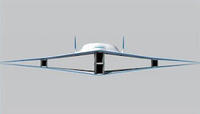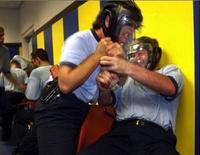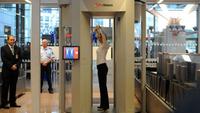-
£5 million investment in U.K. rail technology, business innovation
The U.K. government is leading on an investment of £5 million to accelerate business innovation and growth in the U.K. rail industry, using the funds to support the development of technologies to address technological and business challenges
-
-
New report analyzes the airport security equipment sector
A new report offers a detailed business analysis of the leading 125 companies in the airport security equipment sector
-
-
NY-NJ Port Authority centralizes security operations
The Port of Authority of New York and new Jersey has created a stand-alone Security Department and is now searching for a Chief Security Officer to oversee all security and safety functions, resources, and personnel
-
-
Lego pirate proves, survives, super rogue wave
Scientists have used a Lego pirate floating in a fish tank to demonstrate for the first time that so-called “super rogue waves” can come from nowhere in apparently calm seas and engulf ships
-
-
Bi-plane to revive supersonic travel

Researchers say that the best way to revive supersonic air travel – which came to an end with the retirement of the Concorde in 2003 – would be by building a plane with two wings to a side; computer models show that a bi-plan produces significantly less drag than a conventional single-wing aircraft at supersonic cruise speeds
-
-
Reducing fatalities in traffic’s “twilight zone”

There are more than 30,000 traffic fatalities each year in the United States, and about 2,000 of them occur in stoplight intersections; engineers call them “dilemma zone” — that area before a stoplight intersection where the traffic light turns yellow and the driver is not sure whether to stop or go ahead
-
-
House considers bill to send lost airport money to USO
Lawmakers are considering a bill that would send unclaimed money left at airport security checkpoints to the USO, a major armed forces support group
-
-
Global Entry program expands to four additional airports
CBP announced the expansion of the Global Entry program to four additional airports; the expansion will make the program available at airports serving 97 percent of international travelers arriving in the United States
-
-
New cargo screening unveiled
Smiths Detection’s new HCVMe uses the power of a 4MeV X-ray accelerator and can scan loaded cargo containers with a steel penetration of 200 mm
-
-
Armed pilot program budget to be slashed in half

The Obama administration’s budget proposes cutting more than half the funding for a program that trains airline pilots to wield guns in the event of a terrorist takeover; the program is voluntary and consists of an intensive eight-day training course and a recurring training every six months; thousands of U.S. airline pilots have been trained to carry weapons as a final line of defense against terrorism
-
-
Making bus transportation more secure: Learning from Israel’s experience
A new report on ground transportation security draws on the experience of Israel with Palestinian terrorists’ attacks on buses; the report helps increase understanding of what can happen and of what can deter, prevent, and mitigate terrorist attacks against bus transit
-
-
DHS report concludes airport scanners are safe

A new report by the DHS Inspector General concludes that the Transportation Security Administration’s (TSA) full body scanners are safe; the IG reviewed five independent studies and concluded that an airline passenger would have to be subjected to 17,000 screenings a year, or forty-seven a day, to reach the limit of acceptable radiation dosing
-
-
Air Marshals complain of rampant workplace discrimination
A recently released DHS Inspector General report found that feelings of discrimination against homosexuals, minorities, and veterans were rampant among the Federal Air Marshal service
-
-
Court: Malaysian woman can sue DHS over No-Fly List

A U.S. appeals court has cleared the way for a Malaysian woman to file a lawsuit against DHS and the FBI for mistakenly placing her on the No-Fly List and arresting her at San Francisco International Airport in 2005; Rahinah Ibrahim, who has never been accused of any crimes, was arrested and placed in a holding cell for two hours
-
-
Growing ubiquity of X-ray scanners could pose public health risk
Body scanners are now routinely deployed in airports, border check points, and even the streets of some American cities; with the use of X-ray scanners by law enforcement agencies becoming increasingly commonplace, health advocates worry that the additional radiation exposure could pose a health risk; repeated exposures to low-doses of radiation can lead to cancer; currently federal health standards are primarily limited to medical X-rays and since the body scanners do not fall under this category, the decision on where and how to use the devices is entirely up to security officials
-
More headlines
The long view
New Technology is Keeping the Skies Safe
DHS S&T Baggage, Cargo, and People Screening (BCP) Program develops state-of-the-art screening solutions to help secure airspace, communities, and borders
